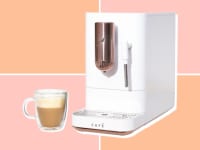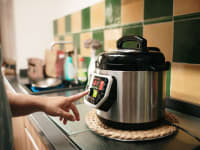Cuzen Matcha Maker Review
This machine makes fresh matcha with the touch of a button
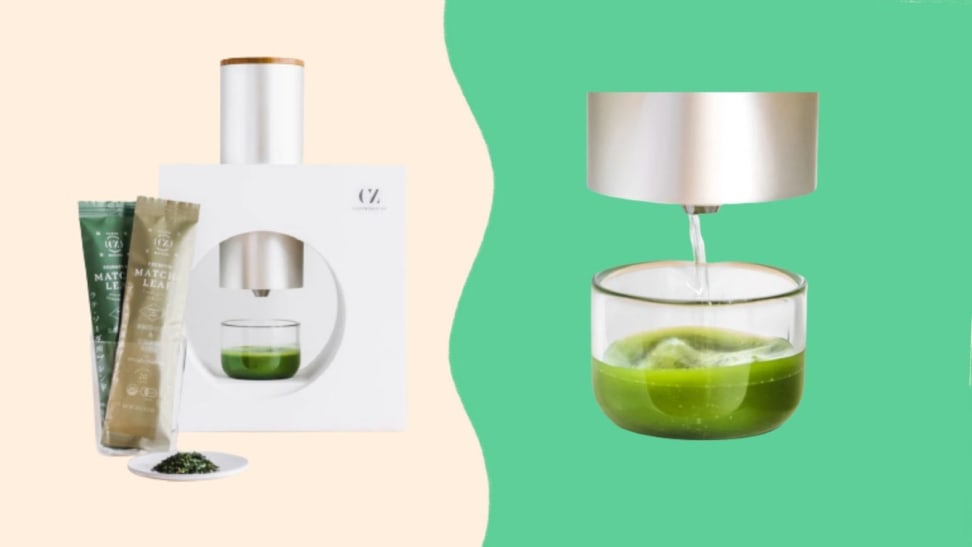 Credit:
Cuzen / Reviewed
Credit:
Cuzen / Reviewed
Products are chosen independently by our editors. Purchases made through our links may earn us a commission.
-
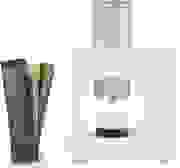
Cuzen Matcha Maker Starter Kit
Pros
-
User-friendly
-
High-quality matcha
-
Sleek design
Cons
-
Expensive
-
Not compatible with other tea leaves
-
For a long time, matcha was one of those drinks I couldn't get on board with. The concept of green tea powder with milk just never struck my fancy. I had even given it a try at a few chain coffee shops (which, in hindsight, was probably a bad idea for a first impression) and regretted it each time, pining after my usual black coffee or latte instead.
But I'm also a nutrition nut—and no stranger to the countless health benefits of drinking matcha. So when I heard about the trendy Cuzen Matcha Maker, which promises high-quality, authentic matcha made with the touch of a button, I was eager to put aside all preconceptions about matcha and give it an open-minded second chance.
What I tried
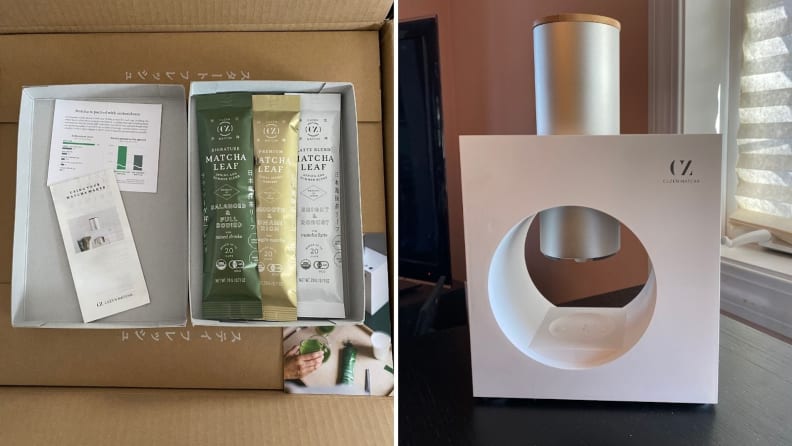
I was excited to see that the Matcha Maker Starter Kit came with three leaf blend options.
I tested the Cuzen Matcha Maker Starter Kit, which includes the machine itself, along with three bags of organic green tea leaf blends—two signature and one premium. Each blend is unique and serves a different purpose; while one is described as bright, robust, and optimal for matcha lattes, another is smooth and umami-rich, making it better suited to enjoy straight-up.
There's currently no option to buy the matcha machine alone, without the supplemental leaves. That's because the machine is only compatible with Cuzen's brand of matcha, and consumers are warned against using any other leaves in the machine, due to their inherent moisture content.
How the Cuzen Matcha Maker works
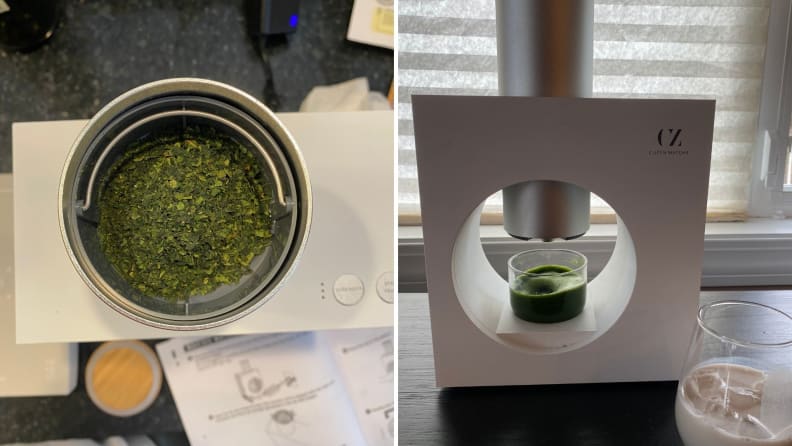
When it comes to making matcha with the Cuzen, all it takes is a few steps.
The Cuzen Matcha Maker is seriously user-friendly. It requires practically no set-up, and arrived at my door ready to go and packed in without a scratch.
The machine consists of a square base with a cylindrical aluminum pipe. The pipe contains a hopper that houses the fresh tea leaves, which is easy to remove with a convenient handle. The base contains a magnet with grooves that cozily houses the whisking cup, where your ready-to-enjoy matcha will live once it's done being prepared.
When it comes to making matcha, all it takes is a few steps: filling the hopper with Cuzen leaves, pouring fresh water into the whisking cup, pressing the strength button one-to-three times (to select matcha strength), and pressing "start."
Then, the magic begins. The machine whirs as the whisking cup spins, and the leaves start to grind into a powder that slowly disperses into the cup over the course of about a minute, as the liquid slowly turns from clear to a satisfying deep green. (This is the time I usually spend getting the rest of my drink ready, whether that be frothing latte milk or gathering ice water.)
The machine beeps when it's all done. Then it's time to remove the whisking cup from the base and pour the green goodness into your beverage, smoothie blender, or recipe.
What I like about the Cuzen Matcha Maker Starter Kit
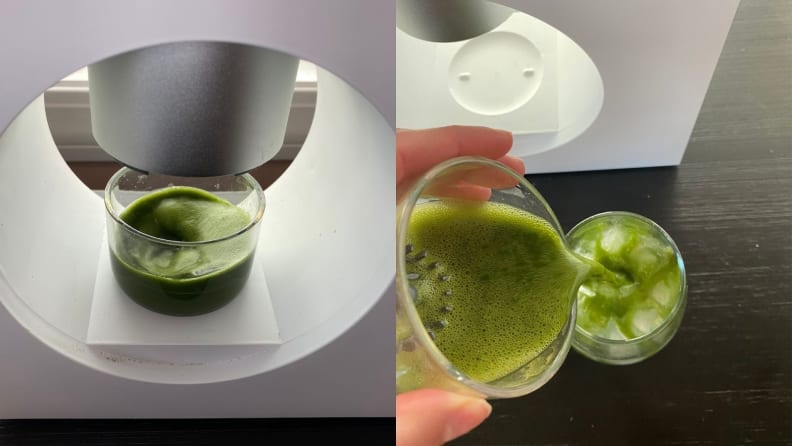
This aesthetically pleasing machine functions perfectly, without confusing instructions.
It's user-friendly
Even as a complete matcha newbie, I never felt intimidated by this machine. The manual booklet that comes with it is very clear and user-friendly, with helpful instructions and graphics that make everything from set-up to clean-up a breeze. There are even illustrations that depict every minor piece of the machine to ensure familiarity with the inner workings of it.
And with only two buttons and a handful of steps needed for each batch, this no-frills machine is easy to get used to. It requires very little upkeep on a day-to-day basis.
For all my other matcha newbies: Cuzen's website offers some recipes to incorporate matcha into your everyday life that go beyond the obvious latte. (Think everything from matcha tonic to zero-proof cocktails and even overnight oats.)
The tea leaves are freshly ground and high quality
Matcha lovers who already have a go-to brand might feel turned off by this machine for the very reason that it's only compatible with Cuzen leaves.
But the good news is that Cuzen leaves are great quality—so great, in fact, that they might make you forget about your previous favorite matcha brand altogether. They're all shade-grown exclusively in Japan, on one of the very few tea farms in the country that are fully organic. It's a special environment with high altitude, moisture, and sunshine that Cuzen claims results in the healthiest of leaves.
In addition to the great taste, this method of growing results in matcha that's more nutrient-dense. It's higher in antioxidants and l-theanine, a chemical that relaxes you and offers the benefits of caffeine with less shakiness and more focus.
Plus: Cuzen customers can receive a 15% discount when they subscribe to receiving Cuzen tea leaves either every month or every two months—so you never have to worry about running out.
The machine is sleek
It's hard to deny that this machine is a looker. Its sleek, minimalist design could match virtually any kitchen, and it's pretty enough to leave out as a conversation starter. And given its decently large size of 8-by-13 inches, it's easier to leave it out on display, anyway—especially if you'll be using it daily.
After having the machine take up real estate on my countertop for a few weeks, visitors had definitely taken note. I welcomed the "Woah, what's that?!" questions, and introduced a couple of friends and family members to the world of matcha, after many of them had never tried it before. It was an exciting appliance to have on display.
What I don't like
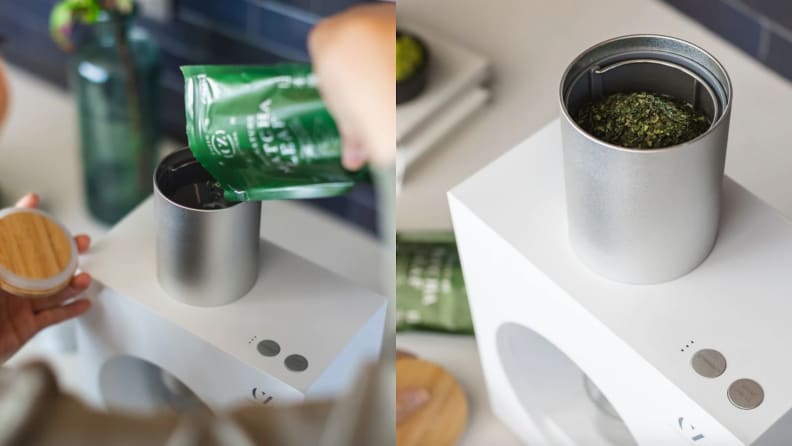
Cuzen cautions against using any other brand's tea leaves in its machine.
It's not compatible with other tea leaves
As I mentioned earlier, any matcha lovers interested in investing in this machine will have to part ways with whatever brand they'd been drinking before it. And that could be a deal breaker for some folks. (I'm picky about certain coffee varieties myself, so I know how it feels.)
Cuzen claims that since other brands' tea leaves contain more moisture than their own, they could cause mechanical failure within the ceramic mill during the matcha making process. (We didn't test this out for ourselves to see what would actually happen to the machine.)
But given that it's possible to find high-quality, Japanese leaves from other companies, I was skeptical to believe that all other tea leaves without Cuzen's name on the packaging would be harmful to the machine. (What makes other organic, shade-grown tencha leaves, for example, that different?)
It's pricey
You have to really love matcha to commit to an almost-$400 machine (and subsequent monthly or bi-monthly payments for specialized tea leaves). And given that using something as affordable as a traditional matcha set, an electric milk frother, or even a run-of-the-mill whisk can get the job done (albeit, without the benefits of fresh leaves), an honest love for matcha might not even be enough to convince you.
For something this pricey, I would've liked to see more features—like a steam wand or hot water spout—to provide more of a complete matcha experience. Instead, I'm still left using supplemental tools to make drinks like a matcha latte or americano alongside the expensive machine.
Is the Cuzen Matcha Machine worth it?
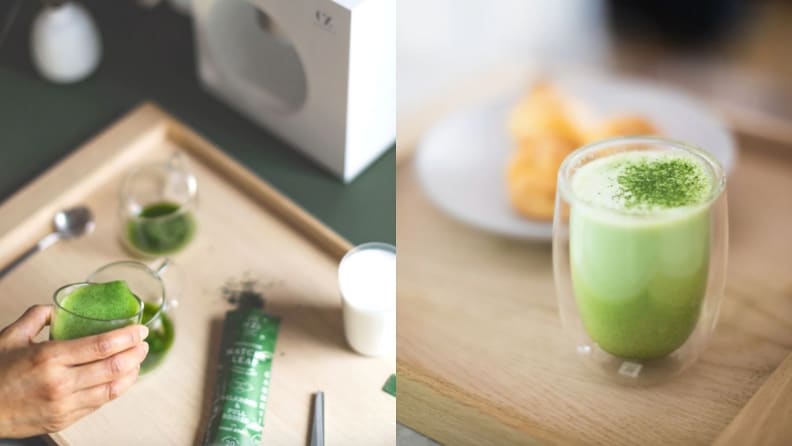
Matcha lovers (without money constraints) would revel in this product's sleek functionality
Only if matcha is your go-to beverage
This machine single-handedly converted me from a matcha hater to a frequent sipper. The ease of use encouraged me to start experimenting with matcha blends and strengths, in everything from lattes to smoothies to baked goods. And while I never spent time whisking matcha by hand before this, it's very possible that I wouldn't be consuming as much of it if I had to factor in that time commitment.
Plus, the appeal of having freshly ground matcha (similar to drinking freshly ground coffee beans versus pre-ground ones) is definitely appealing. It offers a fresher matcha flavor, and provides more antioxidants than packaged powder.
And while $369 might sound steep for a machine that has very limited functionality, if your alternative is buying overpriced matcha lattes from a cafe once or twice a day, it might be worth it. (You might even end up saving money in the long run!)


